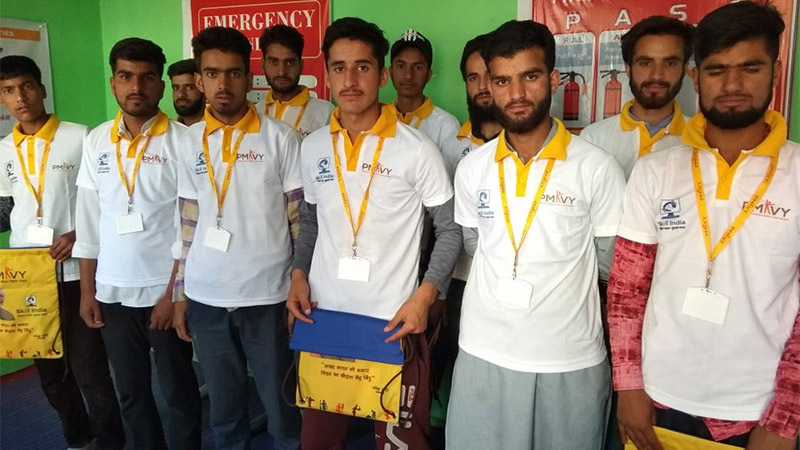

is the flagship performance based skill training scheme of the Ministry of Skill Development & Entrepreneurship (MSDE). The objective of this skill certification and reward scheme is to enable large number of Indian youth to take up performance based skill trainings and become employable (either self or Job) and earn their livelihood. Under this scheme, monetary reward would be provided to trainees who are successfully trained, assessed and certified in skill courses run by affiliated training providers. Specifically, the Scheme aims to: Encourage standardization in the certification process and initiate a process of creating a registry of skills. Increase productivity of the existing workforce and align the training and certification to the needs of the country. Provide Monetary Awards for Skill Certification to boost employability and productivity of youth by incentivizing them for skill training.
What We Did
Bottom up approach shall be adopted for identification and mapping of job roles based on demand from district level.
District level plan will be the fundamental instrument for implementation of PMKVY 3.0.
DSC shall be the focal point for implementation of PMKVY 3.0.
Major role of DSC- preparation of District Level Plan, mobilisation and counselling of candidates, formation of training batches, monitoring and quality assurance and post training support (Rozgar Mela/placement linkages) employment/ self employment and grievance redressal.
Total target of the scheme will be divided approximately in the ratio of 75:25 between Centrally Sponsored Centrally Managed (CSCM) and Centrally Sponsored State Managed (CSSM) Component.
States who have performed well in the PMKVY 2.0 scheme and are willing to take higher targets would be given higher targets.
There will be the Common Assessment Centers for assessment of certified candidates.
Emphasis would be given on online assessment system for theoretical and practical learnings, wherever possible.
Apart of Class-room based training, the focus will be given on-line /blended mode of training in certain job roles.
(i) Aggregation of District Level Demand for State Skill Development Plan:
Each DSC of the States shall identify their job roles based on demand.
SSDM shall aggregate the district level demand for preparation of State Skill Development Plan.
(ii) Creation of District level ecosystem for mobilisation and counselling of candidates:
SSDM will support the DSC for mobilisation and counselling of candidates through Kaushal Mela, Awareness& Advocacy and Publicity.
Ensuring timelines for mobilising candidates job role wise.
(iii) Formation of training batches:
SSDM will support the DSC for formation of job role wise training batches.
(i) Monitoring and supervision of Training quality
(ii) Post Training Support
(iii) Handholding support after placement /self employment
(iv) Verification of placement
(v) Grievance Redressal
| Sr. No. | Activities | Responsibility |
|---|---|---|
| 1 | Approval of Guidelines and launch of Scheme | MSDE |
| 2 | District wise Target allocation (50%) – As per popular job roles (50%)- Demand driven job roles | MSDE/NSDC |
| 3 | Mobilisation, counselling and enlisting candidates | DSC |
| 4 | Empanelment/Selection/Appointment of Training Providers | NSDC/SSDM |
| 5 | Shortlisting of candidates/Batch formation and obtaining TC approval | Training Provider |
| 6 | Start Training | Training Provider |

A. Planning from below, with District level Plans being the fundamental instrumentforimplementation–Policy,StrategicandFundingsupportbyMSDE
B. Mobilisation and counselling by State (not By TrainingProviders)
C. District Skill Committee: Major role in planning, mobilisation and counselling, aggregation of skilling schemes, monitoring and post training employment/ self employment,verification.
D. Orientation shift from Supply Driven to DemandDriven- Bottom up approach for mappingdemand
E. Dynamicdistributionof Funds/Target – Initially 25% for the State Component (May be increased upto100%)
| Component | PMKVY 2.0 | PMKVY 3.0 |
|---|---|---|
| Target Allocation | Supply Driven | Demand Driven |
| Mobilization | Training Provider (TP) | DSC/SSDM/TP |
| Counselling | Training Provider | DSC/SSDM/TP |
| Batch Formation | Training Provider | DSC+Training Provider |
| Training | Training Provider | Training Provider |
| Assessment | SSC empanelled AA | NCVET empanelled AA |
| Certification | SSC | SSC/Other Awarding Body |
| Placement/Self Employment/Apprenticeship | Training Provider | DSC/SSDM/NSDC/SSC & TP |
| PostPlacementTracking/Support | TP/NSDC/SSDM | DSC/SSDM/NSDC/SSC & TP |
| Grievance Redressal | NSDC/SSDM/MSDE | DSC/SSDM/NSDC/MSDE |
| Monitoring/Support | NSDC/SSDM/MSDE | DSC/SSDM/NSDC/MSDE |
| Sr. No. | Scope of Work | Central Component | State Component |
|---|---|---|---|
| 1 | Skill Gap Study | NSDC/SSDM/SSC/DSC | NSDC/SSDM/SSC/DSC |
| 2 | Target Allocation | NSDC | SSDM |
| 3 | Mobilization (KaushalMela + Awareness &Advocacy + Publicity) | DSC/SSDM/State Govt | DSC/SSDM/State Govt |
| 4 | Counselling of Candidates (Identifying Training Needs) | DSC/SSDM/State Govt | DSC/SSDM/State Govt |
| 5 | Formation of Training Batches (Long listing) | DSC/SSDM/State Govt | DSC/SSDM/State Govt |
| 6 | Appointing/ Selecting Training Providers (TPs) | NSDC | SSDM |
| 7 | Training of the Candidates | Training Provider | Training Provider |
| 8 | Payments to Training Providers | NSDC | SSDM |
| 9 | Assessment and Certification | SSC/Any other NCVETapproved Awarding body | SSC/Any other NCVETapproved Awarding body |
| 10 | Monitoring & Supervision of Training Quality etc. | Main: NSDC/SSCSupport: SSDM/ DSC | Main: SSDM/DSCSupport: NSDC/ SSC |
| 11 | Post Training Support (RozgarMela/Placement Linkages/Self Employment Schemes linkages/Apprenticeship) | Main: NSDC/SSCSupport: SSDM/ DSC | Main: SSDM/DSCSupport: NSDC/ SSC |
| 12 | Handholding Support after Placements/Self Employment | DSC/ SSDM | DSC/ SSDM |
| 13 | Verification of Placements | Main: NSDCSupport: SSDM/ DSC | SSDM/ DSC |
| 14 | Grievance Redressal | NSDC/DSC | SSDM/ DSC |
job roles pre-decided by GoI based on training facility available in the district. DSC to mobilise 1.5 times candidates. TP selection by NSDC.
Districts to identify job roles.DSCs to mobilize at least 1.5 times candidates.TP selection by NSDC.
Districts to identify job roles based on demand. DSCs to mobilise 1.5 times candidates.TP selection by SSDM.
Become Training Centre With Us
Any Help in the matter please see the website - www.pmkvyofficial.org